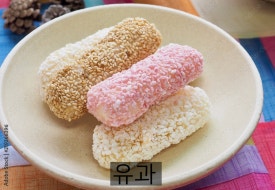In Korea, traditional snacks include Gangjeong and Yugwa, which are eaten on the first day of the first lunar month. These are similar to oranda, hangwa, and yakgwa, but they are different.
Thank you for reading this post, don't forget to subscribe!According to Wikipedia, Hangwa is a general term for traditional Korean sweets, and is also called Jogwa and Gwajeongryu, and it seems that there are many traditional sweets as a subset of them.
Gangjeong is made by putting rice in a puffer machine and puffing it on New Year’s Day or Lunar New Year’s Day, pouring hot taffy, and hardening it with peanuts, sesame seeds, and black beans.
Yugwa is made by shaping glutinous rice flour into an appropriate shape, drying it, frying it in vegetable oil, and then coating it with honey or rice syrup and puffing it with rice, sesame seeds, etc.
The Encyclopedia of Korean Culture states that Gangjeong is a type of Jogwa made by kneading wheat flour with honey and glutinous rice flour, slicing it, drying it, and then frying it in oil, but this is Yugwa rather than Gangjeong.
Depending on the ingredients used as scraps, there are peanut-based scraps, black sesame-based scraps, sesame-based scraps, cinnamon-based scraps, and pine nut-based scraps. In the kitchen, where rice cakes were pushed aside to make tteokguk, each household would make their own scraps and scraps themselves when Seollal approached.
The method of making it is to mix rice cakes with syrup, add nuts, etc., mix well, place the sticky rice cakes on a clean cutting board, flatten them, and cut them with a knife when they have hardened to a certain degree.
In contrast, yugwa is one of the foods served with tea when important guests visit the ancestral home. It is made through a cumbersome process of kneading glutinous rice flour, maturing, drying them thoroughly, and then frying them in oil.

Dakgangjeong is a dish made by frying chicken and then stir-frying it with a seasoning that has been reduced. Some people believe that the original form was kkanpunggi, but it is a separate dish with a different recipe and taste.
Oranda is a snack made by frying small bean-sized snacks called puffed beans or orandaalal-i in oil, coating them with syrup, and hardening them. Among Korean sweets, Tteobapgangjeong, which is made by frying rice, coating it with syrup, and hardening them, looks similar to Oranda. Of course, there are differences such as Tteobapgangjeong being much less hard.
Okoshi is a snack made by entangling and forming shapes with syrup, and is a word used a lot in the Yeongnam region, including Busan, and is similar to the Japanese word okashi, which means snack and was influenced by the Japanese to refer to gangjeong.
Discover more from Creative Innovator in Korea
Subscribe to get the latest posts sent to your email.
